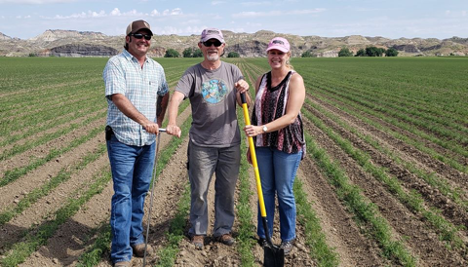We caught up with Jackson and Tracey this week to share a little about Yellowstone River Farm.
 "It all started for us with Liz Carlile’s book Lentil Underground,” Jackson said.
"It all started for us with Liz Carlile’s book Lentil Underground,” Jackson said.
"We took over management of a 420 irrigated farm from Tracey’s parents in 2012 and followed along with the idea that it was best not to make any big changes right away because we didn’t want to be the ones to lose the farm.”
Jackson and Tracey are the 3rd generation.
"The one change we did do when we started here was pull a 9-acre field out of the chemical rotation,” Jackson said.
They planted alfalfa there and left it alone. The crops that were raised on their farm for 50+ years included a lot of sugar beets, corn, wheat, flax, and hay – and a whole lot of chemical and fertilizer. The soil was depleted.
“As we drove around the farm, we started asking why don’t we have any worms? Where did they go and how do we get them back?” Jackson said.
Jackson always became sick when spraying season came around. They bought a sprayer with higher clearance from the field to mitigate chemical exposure and they kept trying to make it work.
“Also, about this time, we started noticing that our dear farmer friends were getting sick with cancer and dying,” Tracey said.
They started asking questions. Why do we use this toxic chemical on milkweed (butterfly food)? They decided to stop spraying the milkweed around the farm and were amazed at the results of that small step; the monarch butterflies moved in.
“If you ask our youngest daughter why we went organic, she will tell you that we did it to save the butterflies! They were definitely our first clue,” Tracey said.
This year they are partnering with a bird conservancy and the NRCS and will be planting wildflower pollinator strips for the wildlife, especially bees who need all the help they can get.
You can find Jackson and Tracey online on Facebook at Yellowstone River Farms. And they also have an Instagram and TicTok account that their oldest daughter is learning how to manage.
Thank you Jackson and Tracey!